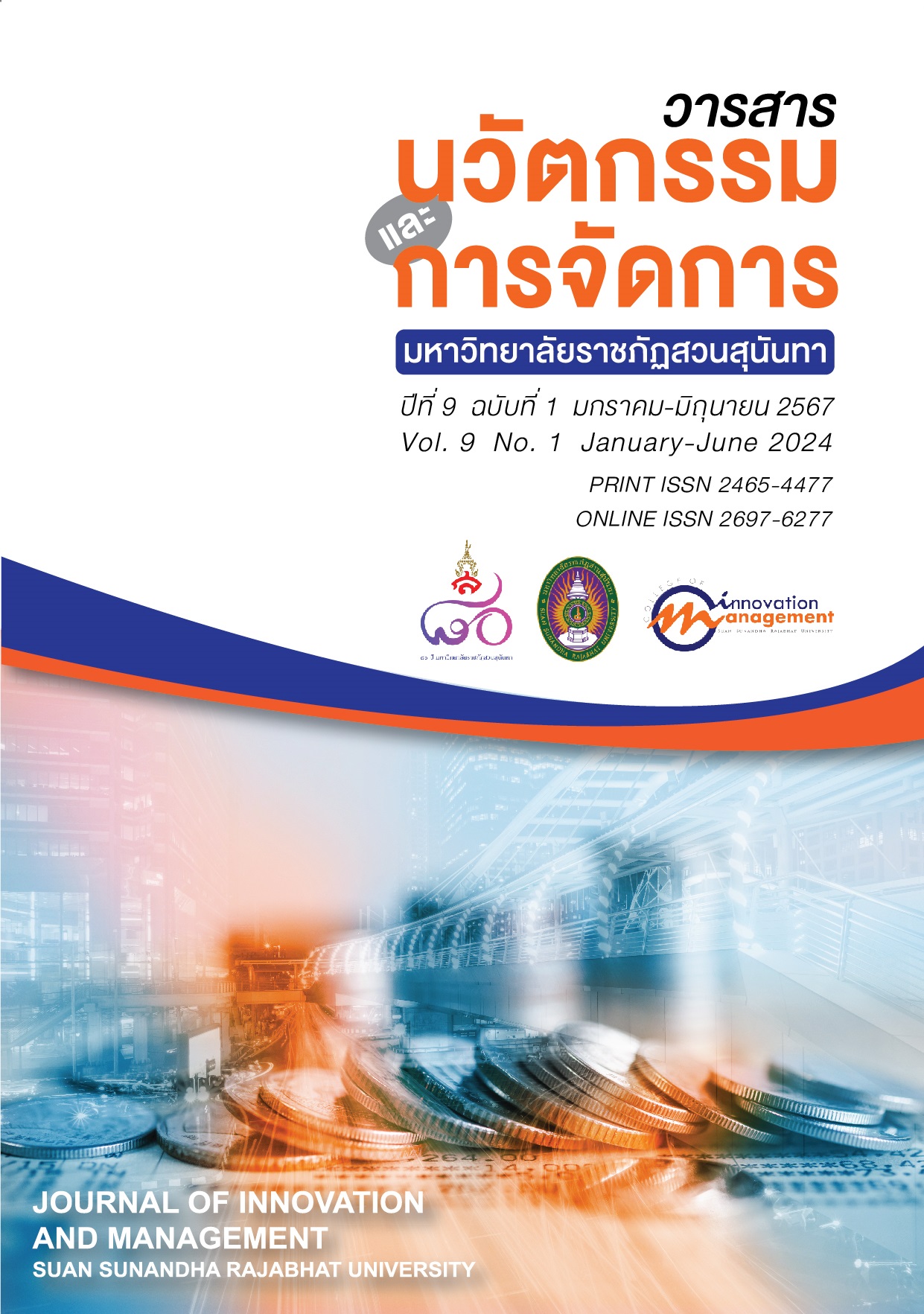A Study of Correlation between English Speaking Ability and Self-Directed Learning by Blended-Coaching Instruction in a Foundation English Course among Thai EFL Undergraduate
Keywords:
Blended-coaching instruction (BCI), Self-directed learning, English-speaking abilityAbstract
This study intends to investigate the correlation between English-speaking ability and self-directed learning by employing Blended-Coaching Instruction (BCI). The population were 3,521 undergraduate students enrolled in the ENG111 Everyday English course at Sripatum University, ranging from the first to fourth years. Purposive sampling was used to select the sample group of 171 students, split into 4 classes, from 9 faculties and 3 colleges. This study was designed as experimental research using the one-group pretest-posttest design. As for data collection, six weeks were dedicated to educating and collecting data using the BCI technique. This instructional technique included five steps— (1) Self-paced online learning, (2) Preparation (Self-learning), (3) Review & Inquiry (face-to-face), (4) Presentation (face-to-face), and (5) Feedback (face-to-face). The research instrument was a self-directed English learning ability test. Pearson’s correlation coefficient was used for data analysis. The results showed a significant difference at a .01 level of significance in the relationship between English-speaking ability and self-directed learning. Therefore, it can be concluded that EFL undergraduate students with high scores in English-speaking ability have a high level of self-directed learning, and conversely, students with high self-directed learning also have high English-speaking ability. This research proposes academic recommendations and suggestions for classroom teaching strategies and future research.
References
Anuphap, K. (2017). Self-Directed Learning for Learning Development in Computer Subject of Prathomsuksa 4 Student. Thesis of the Degree of Master of Education in Curriculum and Instruction. Nonthaburi: College of Education Science, Dhurakij Pundit University. (in Thai)
Azizah SBH, R. T., and Susanti, A. (2021). The correlation between students’ speaking skills and self-directed learning in virtual English community. Paramasastra: Jurnal Ilmiah Bahasa Sastra Dan Pembelajarannya, 8(2), 146–163.
Aupet, A. (2018). Effects of collaborative blended learning in group work ability career and technology 4 subject for Mathayomsuksa 5 students. Veridian E-Journal Silpakorn University, 11(3), 3068-3080.
Bangkokbiznews. (2020). “Solving the problem of 'English' skills, why do Thai people 'lose' over and over again?” Bangkokbiznews. [Online]. Retrieved 6 February 2020, from: https://www.bangkokbiznews.com/social/865234 (in Thai)
Isti’anah, A. (2017). The effect of Blended Learning to the students’ achievement in Grammar Class. IJEE (Indonesian Journal of English Education), 4(1), 16-30.
Marek, M. W., & Wu, W. (2011). Using Facebook and SKYPE as social media in an EFL conversation class. The Proceedings of the 28th International Conference on Teaching and Learning in the ROC, National Taichung University of Education, Taichung, Taiwan.
Merriam, S. B., Caffarella, R. S., and Baumgartner, L. M. (2007). Learning in Adulthood: A comprehensive guide. 3rd ed. San Francisco, CA: John Wiley & Sons.
Niramitchainont, P. (2012). Psychosocial factors related to self-directed learning of Srinakharinwirot University Students. The Periodical of Behavioral Science, 12(1), 129-141. (in Thai)
Puttidirok, A., & et al. (2019). Development English speaking skill by using training communicative language teaching (CLT) for supporting staff at Rajabhat Maha Sarakham University. Rajabhat Maha Sarakham University Journal, 13(3), 231-240. (in Thai)
Riensumettharadol, M.R. and Sujarinpong, P. (2023). English-Speaking Problems and Solutions: A Case Study of Thai EFL Interns in Hospitality and Tourism Industry. Journal of Studies in the Field of Humanities, 30(1), 208-226.
Sorkeomany, B. (2024). Promoting Students’ Speaking Proficiency through Communicative Activities: Case Study of Department of English, Faculty of Education, Champasack University. Souphanouvong University Journal of Multidisciplinary Research and Development, 10(1), 51-62.
Srinonyang, P., & et al. (2018). English achievement of self-directed learning through Edusoft’s English Discoveries. Journal of Srilanchang Review, 4(1), 47-63. (in Thai)
Szabo, F. & Csepes, I. (2023). Constructivism in language pedagogy. Hungarian Educational Research Journal, 13(3), 405-417.
Tongnate, K. (2014). The Development of Learning Model of Blended Learning Online. (Research Report). Maha Sarakham University: Rajabhat Maha Sarakham University.
Wangphasit, L. (2019). A development of coaching model to enhance English communication skill of education students’ Srinakharinwirot University. Journal of Education and Innovation, 21(1), 183-195. (in Thai)
Wolff, M., and et al. (2019). Coaching to improve self-directed learning. The Clinical Teacher, 17, doi: 10.1111/tct.13109.
Yimyam, S., and et al. (2015). Developing on Blended Learning for developing the 21st century learning skills. Nursing Journal CMU, 42, 129–140.
Downloads
Published
How to Cite
Issue
Section
License
Copyright (c) 2024 Journal of Innovation and Management

This work is licensed under a Creative Commons Attribution-NonCommercial-NoDerivatives 4.0 International License.
See Publication Ethics https://so03.tci-thaijo.org/index.php/journalcim/Ethics






